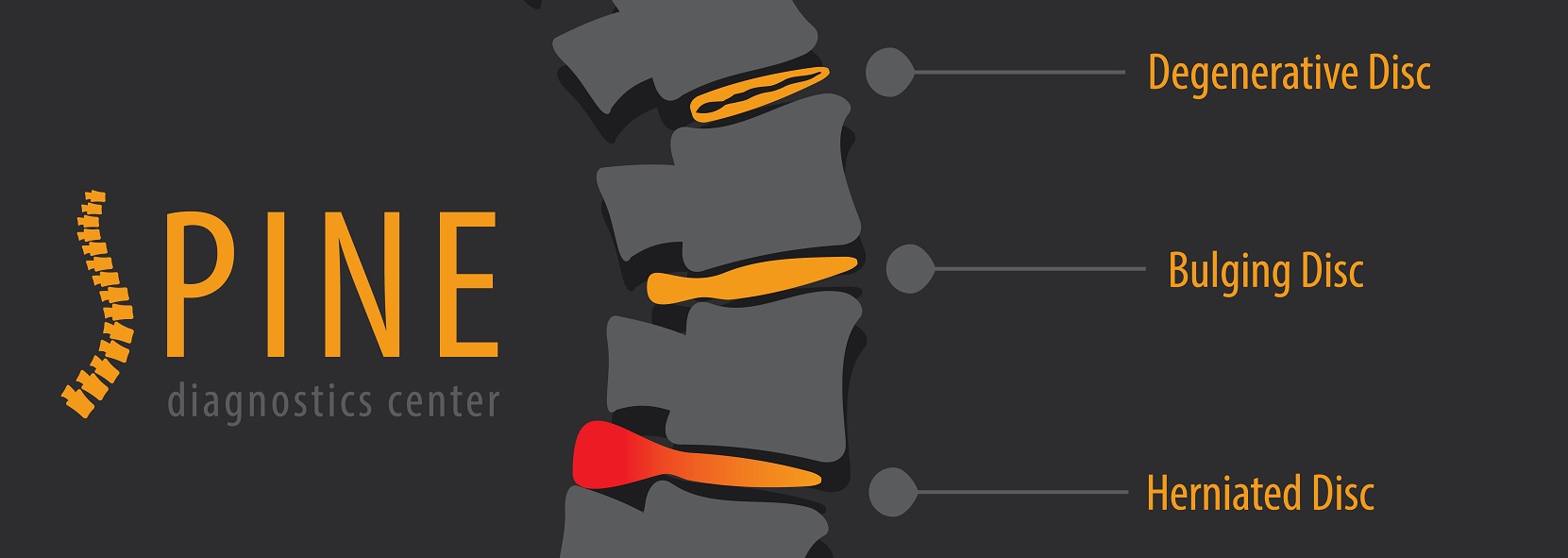The word sciatica actually means “leg pain”. Patients with back pain often develop leg pain since the sciatica nerve can get irritated sending pain down the course of the nerve as it travels through the leg to the foot. For example, a herniated disc that presses on one of the nerve roots of the sciatic nerve, which then continues from the lower back down the back of the leg, may cause pain and numbness in the leg, leading to condition called sciatica. Sciatica is one of the most common symptoms of a herniated disc in the lower back.
The bones that form the spine in your back are separate by small discs, which in turn cushion the spine from impact and shock. These discs are oval and flat, with a tough, outer shell (capsule or annulus) that surrounds a jellylike material, called the nucleus in the center. It many respects they look like a common jelly donut, with a soft interior and firmer exterior.
When these discs are young and healthy, they act as shock absorbers for the spine while keeping the spine flexible. When these discs are damaged from an injury or wear and tear, they may bulge or break even (rupture). When a disc bulges or ruptures, it is called a “herniated discs”, (“slipped” in lay terms).
While herniated discs can occur in any part of the spine, more than 90% of herniated discs affect the lower back (lumbar spine). The remainder occur in the neck (cervical spine) and very rarely in the upper back (thoracic spine).
Although injury to the outer covering, or annulus, of a disc can cause pain, often a herniated disc by itself does not cause any pain until it presses or touches the nerve roots exiting the spine.
In a mild to moderate disc herniation most of the pain is felt in the back with occasional pain radiating into the buttock or upper thigh. In more severe disc herniations, where nerve roots are badly compressed, pain will extended down the course of the sciatica nerve very often into the lower leg, calf, ankle and foot. If the nerve pressure from a protruding disc is great enough, nerve function can get compromised leading to numbness and even neurologic weakness of the lower leg. So generally the symptoms of a disc herniation depend of the amount of nerve pressure it creates, if any. In mild to moderate disc problems, pain may be local to the lower back only. In larger disc herniations that encroach up spine nerves and create pressure, pain extends into the buttock and thigh and in the most severe cases, into calf, ankle and foot.
In addition to the symptoms of pain, the part of the sciatic nerve that comes from the lower part of the lumbar spine controls three important functions; sensation to the skin of the lower leg, reflexes of the leg and neurological control of the muscles of the lower leg. Any alterations in these three functions of the sciatic nerve can be a sign of nerve pressure from a herniated disc as well.
A spine specialist can often diagnose a herniated disc using a medical history and physical examination by focusing on the functions of the sciatic nerve listed above and the location and pain. If there is some question as to the source of the pain or the potential size of the suspected herniation, you may need additional tests such imaging tests (like an MRI or CT scan), to confirm a diagnosis.
While some herniated discs can heal on their own over time, many herniated discs need some type non-surgical (conservative) treatment to improve. This may include a short period of rest, chiropractic manipulation, medication(s), “de-compressive” therapy (one type of which is called VAX-D therapy) and physical therapy. About 50% of people of those with herniated discs recover within 1 month, with more than 95% recovering after 6 months.
Very few people with herniated discs have enough pain or neurologic damage to warrant having surgery. The most urgent reason for surgically removing all or part of a herniated disc (disectomy) is if the sciatic nerve roots are under enough pressure to create some and neurologic damage. In cases such as this it is important to decompress the nerves being affected as quickly as possible to avoid permanent impairment.
The signs and symptoms that most often indicate the need for a surgical consultation are the combination of 1) progressively worsening loss of sensation to leg, 2) progressively worsening loss of reflexes and 3) progressively worsening motor weakness in the lower leg. As long as the patient is not showing these three signs of neurologic deficits and there are no other signs of severe spinal cord compromise (bladder or bowel dysfunction), a conservative non-surgical treatment is usually the option of choice.

